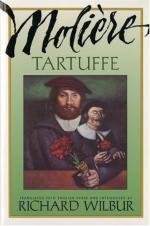|
This section contains 6,854 words (approx. 23 pages at 300 words per page) |

|
SOURCE: “Harpagon: the Paradox of Miserliness,” in Papers on French Seventeenth Century Literature, Vol. 22, No. 43, 1995, pp. 555-69.
In this essay, McCann claims that the humor in the character of Harpagon in The Miser comes not from his excessive avarice but from his paradoxical but inherently logical revisions of concepts of generosity and charity. As a result, McCann suggests, Harpagon retains his humanity, even if he is not finally reformed.
Being mean is not funny. We despise those whom we consider to be tight-fisted. People such as Harpagon, therefore, are unpromising subjects for comedy. Yet, as Pierre Gaxotte has pointed out:
Par bonheur, Molière a éclairé son homme de tant de façons, lui a prêté tant de postures que non seulement il fait rire de ce qui aurait pu paraître odieux, mais qu'Harpagon se trouve être de tous les temps, du nôtre comme du...
|
This section contains 6,854 words (approx. 23 pages at 300 words per page) |

|


